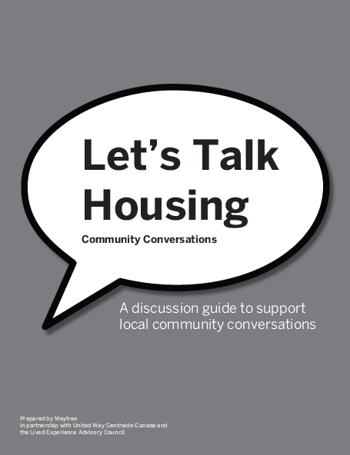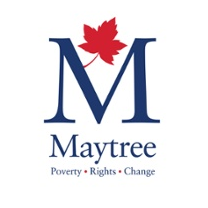Canada's National Housing Strategy Public Consultation
The Government of Canada is gathering people’s thoughts and ideas on the development of a national vision for housing and a national housing strategy. On the Let’s Talk Housing website, all Canadians are invited to provide feedback on four housing themes through an online survey and/or by uploading a written statement. The deadline for completing the online survey or submitting a statement is October 21, 2016.
 Why a Community Conversations Guide?
Why a Community Conversations Guide?For a variety of reasons, many people will not participate in the Let’s Talk Housing consultation process. Maytree, United Way Centraide-Canada and the Lived Experience Advisory Council believe that consulting those directly affected is necessary for the success of the national housing strategy. The community conversations will address this gap in the Let’s Talk Housing consultation process by creating opportunities for engagement. Community conversations are intended to be inclusive, transparent and accessible for people who have complex housing needs, who are experiencing homelessness or are precariously housed.
Local community conversations are designed to engage people who face barriers to participating in formal consultation processes, and whose complex housing experiences and ideas will provide crucial input for the creation of the national housing strategy.
Access the Community Conversations Guide
Sharing the Results of Your Conversation
Once you've followed through with your conversations as outlined in the guide, Maytree provides four options for sharing highlights/key messages to inform the government's National Housing Strategy to help create better housing and homelessness policies in Canada:
- Maytree and United Way Centraide-Canada will be submitting a cross-Canada compilation of the feedback from local community conversations to the Let’s Talk Housing consultation process. If you want your community conversation to be included in this larger submission to the Government of Canada, please email it to Maytree (evlachoyannacos@maytree.com) by October 7, 2016. We will share the final document with the communities participating in this initiative.
- Submit the thoughts, ideas and results of your conversation to the Government of Canada’s Let’s Talk Housing conversation process on the www.letstalkhousing.ca website, using the “Upload a written statement” button. The deadline to submit your ideas to the government is October 21, 2016.
- Share your Let’s Talk Housing submission with your local elected representatives from all levels of government and, if conversation participants are interested, consider meeting with your elected representatives to talk through your submission.
- Share your Let’s Talk Housing submission with other people in your community.





